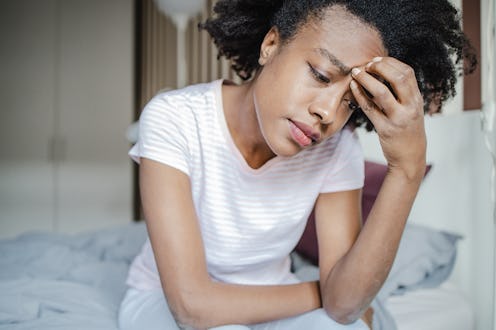Life
7 Things You’re Doing That Can Cause Bad Dreams

We've all had at least one dream in which our worst enemy is out to get us, or all our teeth are falling out. Bad dreams are a common part of how we sleep; it's unknown whether or not other mammals and other animals have similar nightmare patterns, though many species do show signals of dream-like states. Many of us wonder what causes bad dreams, and if there's anything we can do to help us sleep better. Turns out, there are seven simple things you can stop doing if you're over constantly having nightmares.
Nightmares, it's important to note, are different than night terrors, which many people also suffer from. We tend to dip between different depths of sleep throughout a conventional night's rest, and night terrors are sudden washes of fear or negative emotion as you transition from one stage of sleep to another. Nightmares, by contrast, tend to happen during rapid eye movement (REM) sleep, the deepest stage of slumber, in which the brain remains active while the body is almost fully at rest. REM periods lengthen as the night goes on, and nightmares often happen in the longer REM periods.
But bad dreams aren't an inevitable part of your REM sleep. These are seven simple things that can cause bad dreams, that you can stop doing tonight for a better night's rest.
Eating Cheese At Bedtime
A pretty usual suspect for nightmares is what you eat before bed. Yes, your night cheese might actually be at fault here. The National Sleep Foundation explains that eating too close to bedtime can rev up your metabolism, prompting more brain activity during REM sleep and a higher risk of having bad dreams. In one bizarre, unscientific survey in 2005, the British Cheese Board gave various people types of cheese to eat before bed and asked them to describe their dreams; cheddar dreams were about celebrities, while Stilton created nightmares.
Staying Up Late
Yet another reason to listen when Netflix pauses your binge-sesh. Evidence suggests heavily that delaying sleep and being deprived of it altogether increase your likelihood of nightmares once you finally hit the sack. A 2011 study in Turkey found that there's a strong correlation between being a night owl — staying up late habitually — and having more nightmares. For your best sleep, make like Gwenyth Paltrow and go to sleep at the same time every single night.
Not Sleeping Enough
If you don't get to bed early, chances are you're not going to be sleeping enough — and that can cause seriously bad dreams. Some studies have found that sleep deprivation intensifies dreaming in REM states, including the probability of nightmares. Basically, anything that mucks up regular circadian rhythms, from jetlag to a period of intense partying (we've all been there), is likely to increase the possibility of having a nightmare.
Not Managing Your Stress Level
You know that meditation app you've been meaning to download? Here's your excuse to do it. Higher levels of anxiety and stress are tied to nightmare occurrence. Our emotional levels during waking hours carry through to our brain activity during the night. It's believed that dreams serve an emotional purpose, in that they reflect and process what we're experiencing while we're awake — but if those experiences are stressful, our dream-life will pick up on that.
Some scientists theorize that humans evolved to use nightmares as a kind of safety valve for anxiety and fear, so that they could operate more functionally during the day. However, Scientific American reported in 2010 that a study of Australian teens found nightmares fail to diffuse anxiety, and in fact make people more anxious in general.
Drinking Alcohol Before Bed
Sorry to ruin weekends for you. Drinking alcohol before bed (or, you know, when you're out late and you collapse into bed without taking your makeup off) not only makes you sleep worse, it increases the ratio of REM sleep to deep sleep, multiplying the chance you'll have a bad dream. You don't have to have been partying to feel this effect, either; just a glass of wine with dinner will make you more susceptible to having a bad dream.
Being In A Bad Mood
Low life satisfaction was shown to be a strong predictive factor for nightmares, as a 2015 study showed, though it's unclear whether that's a matter of cause and effect, or if it's simply part of a cycle of negativity. If you're experiencing low mood, nightmares may result, and therefore make your mood worse. A 2016 study from Finland showed that sufferers of Seasonal Affective Disorder were much more likely to experience nightmares in the winter than people who didn't experience depression and anxiety as the seasons changed. If you're feeling down on an ongoing basis, take steps to brighten your mood, whether that's leaving a toxic work environment, making time to exercise, or consulting a mental health professional.
Taking Certain Medications
Some medications have some pretty surprising effects that can carry over into your sleep. An overview of the evidence in 2013 found that, while being on tricyclic antidepressants makes dreams happier, withdrawal from those medications, MAOI-type antidepressants, or SSRIs can cause nightmares. Adjusting doses of SSRI and SNRI-type antidepressants seemed to "intensify" dreaming states, which could lead to bad dreams. This is no reason to stop taking antidepressants if you're on them to treat depression; on the contrary, finding a stable dose of an antidepressant can help with multiple causes of bad dreams.
Other medications, including beta-blockers for heart conditions and drugs for Parkinson's disease, have also been linked to nightmare frequency. If you are experiencing nightmares on an antidepressant or another medication, don't stop or drop a dose without consulting your doctor first: It's likely there are other options to help you.